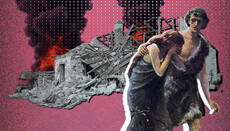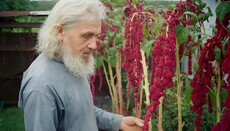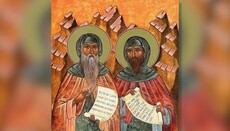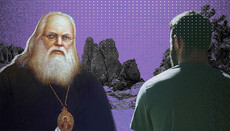Transfiguration – a new birth in Christ

The path to spiritual rebirth lies through conscience, self-denial, and victory over one’s own “I.” What is the metamorphosis of the soul, and how do we let Christ enter our hearts?
“Transfiguration” is a wondrous word. It comes from the Greek metamorphosis. A metamorphosis is a reshaping, a transformation. The caterpillar becomes a butterfly; the old man becomes new.
Transfiguration is the spiritual birth of man into eternal life – when within us the mortal, the corruptible, the superficial, and the selfish dies, and from the shattered shell emerges the person God intended from the very beginning.
This true self even now lives deep within us – like a silent embryo, something elusive, mysterious, tranquil, unbound by anything external, passionless, calm, and filled with peace. This infant within us looks at all that happens as though from the side – watching and silent. It is our spirit, the great mystery that binds us to the Creator of the universe.
By body and psyche we differ little from other creatures. Yet in man alone there is a hidden door – and opening it, he steps directly into the presence of God. This door is our spirit, made in the image of God – a treasure possessed only by us. Nothing in the universe is more precious. And it is for this treasure that the great battle of the world is fought.
Guarding the entrance to this treasure stands a malicious little dwarf – the ego – pretending to be our true self. This false “I” frets over everything, fears all things, chatters endlessly in our mind, curious about trifles, restless and distracted. Meanwhile, the spirit remains silent, radiant in love, brimming with heavenly joy, serenity, and peace. The old man, on the other hand, is filled with anger, judgment, and agitation.
The soul may return to its spirit, may reunite with it, by entering through the door of dispassion. But first, one must defeat that cunning little monster called egoism.
When it dies, the world of enmity and hatred dies with it – and man finds himself in a new reality, filled with love and compassion. Outwardly, nothing changes: the same houses, the same roads, the same earthly life. Yet inwardly – everything is different.
Where does transfiguration begin? With small, simple things – with conscience. Our lives are woven of thousands of little deeds, but each of them can be illumined by a great heart.
Once, a friend of mine in the heat of summer went to visit the grave of her parents in a distant cemetery three kilometers from her village. After praying, she was about to leave when she heard a faint, pitiful mewing from the bushes. She found a half-dead kitten, abandoned by some cruel hand to perish. What to do? Walk away, telling herself, “Not my problem”? Or act according to conscience – for here was a living creature, suffering and longing to live?
She already had a dog at home, the house was under repair. Yet she could not leave the defenseless kitten to die. She took it home. The poor creature, frightened by the dog, ran out onto the balcony under repair and fell from a fifteen-meter height. Long weeks of care, expense, and operations followed. The kitten survived. Friends told her she was foolish. But her heart knew the truth: this was a test of love. Had she abandoned the kitten, her conscience would never have let her rest.
Yes, to act according to conscience often brings hardship.
But conscience is the first step toward Mount Tabor. Never go against it, however heavy the cross. Self-denial is the second step. Dispassion, the third.
Transfiguration always takes place through overcoming the resistance of one’s selfish will – when it is necessary to act as is right, and not as one desires. When a person sacrifices comfort, tranquility, and safety for the sake of what conscience, honor, responsibility, duty, and the truth of God demand, he begins to change. That is when the true metamorphosis occurs. Genuine joy comes only to those with a pure conscience. Others may have merriment, but it must not be confused with quiet, peaceful, radiant joy.
Egoism casts a shadow over every human amusement. The shadow of fear pursues a person daily. Our old man plays cunning games with us. He is endlessly curious and draws us to unravel the mysteries of the universe, to marvel at the secrets of the world around us, leaping from one branch that catches his interest to another just like it. The mind, in doing so, deceives us with false conclusions and diverts our attention from salvation.
Why do most people never undergo transfiguration, but seem instead to walk in circles year after year? Because small earthly pleasures are enough for them. They have no desire to look deeper within themselves. Yet if they were to do so, they would discover there the very heaven of their own spirit.
Our life will end in one of two ways: either we overcome the world, or the world overcomes us – unless we find Christ within our hearts.
The infinite life of Christ – in whom all lives and moves – is given not to those who love this present age, but to those who love God with all their heart, all their soul, all their mind. A little attentiveness, patience, and watchfulness over oneself, and a man learns by experience that nothing exists outside the spirit united with Christ. He who remembers God always forgets evil, as St. John Chrysostom taught.
Pride, self-opinion, self-pity, and sloth prevent the soul from ascending Mount Tabor. That is why God allows circumstances that humble our pride. Transfiguration is the union of the human spirit with the Spirit of Christ, and the peace born of it. Such a person radiates serenity, bringing peace to all creation. In this is true freedom – the independence of the soul.
A transfigured mind sees no enemies, no strangers, no division between good and evil people.
The good man wishes salvation for all. But if we hate even a single person – even our fiercest enemy – the light of Christ becomes inaccessible to us.
Evil does not come from people or circumstances, but from evil thoughts about them. Malice toward others is born of the malicious commentator within our own mind. We see its fruit on the internet, where bile and hatred, hidden in daily life, pour forth under false names in social media.
The world is hopelessly sick. It cannot be resurrected – but we can save ourselves from it, lest we perish with it.
How do we overcome the spiteful dwarf that lives within us? First, we must expose it – strip away its disguise. The holy fathers teach that this requires discernment. Ask yourself: “Who is it that thinks these thoughts in my mind, which I myself reject? Who grows angry, despondent, or lustful within me? If that is truly me, then who is the one within me that looks on and judges these thoughts?”
Thoughts are changeable, feelings as well; the body lives its own life, and the mind wanders across the whole world. But where am I? Where is my true consciousness? Our repentance is possible only because we can separate ourselves from that negativity which dwells within us – from that which we ourselves do not accept and with which we do not wish to identify.
When a man’s spirit discovers the mental parasite that disguises itself as our “I,” it begins to hunt it down. The old man fears to be exposed – he cannot endure the light. That is why carnal, unspiritual people are incapable of repentance. In their imagination, they always consider themselves right and others guilty. Their opinion, as they believe, is the center of the world and the measure of truth. Such people are incapable not only of genuine transformation of the soul, but even of faith in God – for faith requires repentance.
The reunion of the soul with the spirit – this is transfiguration.
It is the soul’s return to its native home, into the embrace of the Heavenly Father. Yet the road is long and arduous, demanding much effort and patience. If we are still mired in the swamp of sins, passions, and attachments, then we have not yet even begun. But if only we knew what awaited at the end of this path, we would waste no time on idle chatter or diversions.
As folk wisdom says: bees do not waste time proving to flies that nectar is better than filth – they simply gather honey. So must we hasten to live – for the days are evil, and God has not promised us tomorrow.











